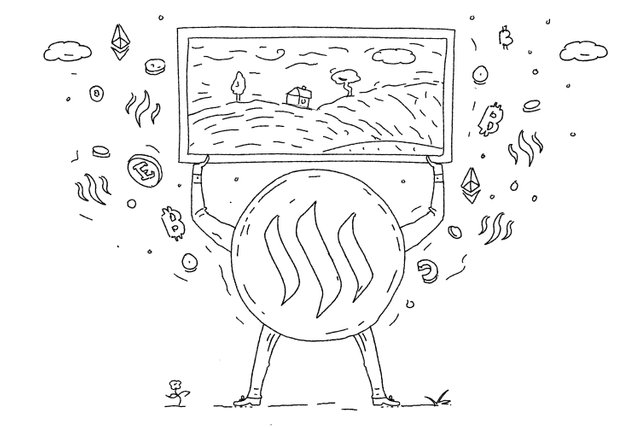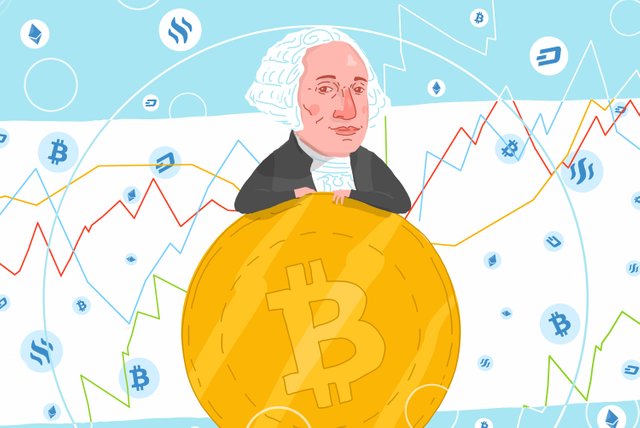The Biggest Problem with Cryptocurrency is that it is Called Cryptocurrency
So Much Name-Calling
As with any disruptive new tech, cryptocurrency is being met with more skepticism than adoption. It’s difficult to find any new report on crypto or blockchain technology without terms like “scam” or “bubble” or “pyramid scheme” coloring the perception of the general consumer. Misinterpretations of hearsay use-cases silo the public’s understanding of the technology as well, equating corner-case adoption with corner-case potential. For the last near-decade, connotations of digital currency have prevented it from being a viable alternative coin in the global marketplace.
But why is this? Why are cryptocurrencies so often associated with hackers, pirates, fascists, and traffickers? The declarations by Jaime Dimon, CEO of JP Morgan Chase, last September of Bitcoin being only applicable to “Venezuela or Ecuador or North Korea” struck an underlying anxiety amongst investors and contributed to crypto markets falling over 30%. This isn’t an isolated incident and every so often, big figure-heads with deep pockets pop up with soundbytes filled with “FUD” - Fear, uncertainty, and doubt. Anonymity is shamed as shady and transparency is understood as anti-liberty.
Bad press aside, there is the notorious condition of volatility. “Why would I spend Bitcoin on a carton of milk when it may cost double that amount tomorrow?” And the same problems persist inversely when markets are good - “Why would I spend several Bitcoin on a car now when I may only have to spend half that number in a few months?” The combination of price volatility and intangibility nurtures a distrust that this is in any way a practical or trustworthy currency.
But that is because cryptocurrency isn’t a currency.
Capturing Value
At least not “currency” in the same way we weigh euros, pesos, and yen. It isn’t meant to be valued always in relation to the US Dollar, despite constant market evaluations, and it isn’t designed to maintain a predetermined monetary worth. “Currency” is a historical misnomer from when the progenitorial Bitcoin was wholly considered to be a direct fiat alternative and implies that it would be used to purchase and sell another product or service.
Think about how you use your cash in your wallet. It comes and goes whenever you earn it from providing something or spend it from wanting something else. Cash is only a mediating tool from person to person, service to thing. If you piled all your available fiat money in front of you, it would indicate almost nothing other than your economic level and security - It tells nothing of how you earned it, why you earned it, how you intend to use it, and other implications of your professional or personal standing in the world.

Tokens, another moniker for digital currencies, recoup that missing knowledge. They can be designed to capture a specific value and portray much more than a singular monetary amount. We see this happening with more recent applied tokens that have correlating applications and communally integrated technologies. Have 50,000 STEEM? You are most likely an avid and valued content producer on a website like Steemit.com, where blog posts and curation are rewarded with STEEM tokens. Have 100,000 Siacoin? You probably share a great deal of cloud storage through their decentralized application that allows you to rent excess hard-drive space. As specialized tokens are distributed for specialized work, cryptocurrencies capture more meta and social data than a purely monetary purchase. Cryptocurrency thus maintains an innate trust system such as “proof-of-work” or “proof-of-stake” that verifies one’s measurable authenticity from their work or effort to earn it. In a traditional market, do you inherently trust someone more for having $10,000 in their bank compared to $1,000? Decentralized verification with crypto and blockchain DAOs is opening the doors for a more integrated trust network.
Think of it as a point system, something we implicitly use on a daily basis. We earn points for completing levels of Candy Crush, drinking enough Starbucks lattes, or topping off our metro passes. Yet the greatest issue concerning existing systems such as these are that the points are non-transferable to other sub-economies and not even reverse-transferrable to fiat currency. It may say that you have $10 remaining on your coffee gift card but that value means nothing beyond the uniformed cashier and barista. Utilizing autonomous cryptocurrency systems overcomes those blockades. As those crypto “points” reach a recognized demand, they can begin to be traded between each other (one latte for a single ride) without the fear of loss in value.
In this mindset, crypto is more akin to commodities in a mercantile era when wheat was traded for corn and silk for spices. The “currency” embodied the metadata of the producer’s skill, locational knowledge, and much more, all while prices were constantly in negotiation (or “volatile”) in relation to supply and demand. Price of any given currency was thus highly dependent on the merchant’s personal skill as well as on a case-by-case basis. Today’s standardization in a fiat economy betrays those relationships as Big Macs are stuck at $4.99 and a pair of Nikes at $90, regardless of their actual value at any moment in the marketplace.

Not only does this empower the local maker to actively influence the value of his/her service, but also allows them to begin valuing their work divorced from local economy health and social conditions. Craftsmen shoemakers no longer need to work at odds with East Asian mass producers who undercut their global competitiveness. They can instead be valued differently in a profession-specific guild system that transgresses borders. Even though the artisan can be momentarily undermined by external competitors, they can sustain their worth and reputation within the community by offering a diverse services and knowledge not typically provided by other corporate structures. That value, until now, has been encased in their product without opportunity to be shared separately.
Homogenization of fiat also obscures the value of services and skills. Distinct operations, even within the same profession, are subsumed into an average hourly wage or salary or price tag and ultimately places great emphasis on the outcomes of work rather than the aspects of work itself. A dynamic token system dismantles these broad assignments of professional value and motivates a different incentivization strategy. A more difficult hour of work should be worth more than a less difficult one and a distinct skill should be valued over a period of automation. In this case, volatility is not something to be fearful of, rather, it is something to be leveraged for more discerning value.
These factors and qualities constitute cryptocurrency into something very different than just a monetary amount and upturns our current relationship with value - value in our personal lives and through professional work.
So how should we treat crypto?
Current hype around blockchain buzzwords and investment returns is actually distracting from the true adoption of cryptocurrencies as a value mechanism. This is understandable as token sales have skyrocketed past VC investments and traditional equity distribution, but the stereotype remains that access into crypto holdings and use relies on dollar purchases and personal investment. This could not be further from the truth.The world of cryptocurrencies is no longer nearly as monolithic as it was even a few years ago. Consumers are able to purchase, hold, and use from almost 1,700 different tokens, even though only a fraction of that selection has functioning applications and use-cases today. Most importantly, they’re able to earn specialized tokens by performing desirable tasks - gaming, storing data, producing blog posts, peer-reviewing articles, verifying work authenticity, and an ever-increasing list of valued services. Better iterations of those services are rewarded with higher amounts of the corresponding crypto.
No longer does the user have to worry or hold any amount of Bitcoin for example, and can instead focus completely on the token that concerns their work and interest.

Cryptocurrencies have now become a vehicle for self-investment and self-establishment in unique global economies. Crypto is your stake in something, whether a hobby, service, or skill, that is nurtured personally. And now that those points are seamlessly transferable between each other, there is no barrier to fear with emerging opportunities - for example, from transitioning as a publicized MySpace user to a Facebook figure to an Instagram influencer. The decentralized economy of value is already proving much more expansive than the typical race to the top that only supports a handful of success stories. There is more value now and more opportunities for people of all backgrounds to capture that value.
“Currency” is one of those placeholder terms, tentatively used for now to vaguely understand the economy that is not yet here.Finally, the individual user’s capacity to drive the growth of a token and determine its functionality is one of the most exciting parts of the blockchain ecosystem. This sort of idea exists in theory with fiat systems, for example trickle-down economics or a focus on small-businesses, where driving factors influence the overall population’s economic health, but a cryptocurrency explicitly outlines the direct connection. No matter the health of the US economy, a quarter maintains a quarter’s worth and will most likely only net you a gum-ball now and years down the line. Especially during these initial development stages for blockchain technologies, the success or defeat of a new token economy will be determined by its use-cases and circulation, i.e its users, regardless of their affiliation with any core or original team. The cryptocurrency holder is the equity holder.
So ultimately, cryptocurrency becomes much more than having a finite amount of dollars and cents in your personal account. Crypto is meant to be earned through a variety of specialized actions and services and circulate much more freely beyond both national and disciplinary boundaries. It is meant to be bolstered by personal dedication. It is meant to determine one’s standing in a growing global audience of like-minded users. It is meant to drive different forms of personal growth and communal sharing in a manner that has never been effectively incentivized before.

As with any disruptive new tech, what exactly things are and how they’ll transform the world are still nebulous terms and analogies. More accurate jargon will emerge as theoretical advances incrementally mesh with the real working world, during which the abstract terminology today will be replaced with precise experience tomorrow. “Currency” is one of those placeholder terms, tentatively used for now to vaguely understand the economy that is not yet here.
This article was originally published by Sndbox last year and has been edited for redistribution through The Creative Crypto. Thank you to the Sndbox team for this article contribution!

Posted from my blog with SteemPress : https://thecreativecrypto.com/the-biggest-problem-with-cryptocurrency-is-that-it-is-called-cryptocurrency/

I read another article the other day that wasn’t was technical as yours but also touched on the same point! The biggest problem with cryptocurrency adoption at the moment isn’t the volitalily or the tech those things can be mitigated by logic and knowledge. Blockchain has marketing problem it just doesn’t have a sexy inclusive narrative to it yet that the average joe could pick up and understand without breaking down completely
Enthusiasts like us who are early adopters don’t really do a good job either since we’re so fascinated and so passionate about the technical aspects and possiblites we happy to speak in the jargon and learn but not everyone is going to be like that we are just the base from which the knowledge will flow from to the rest of the world. We as evangelists need to find a simplistic and attractive narrative that will click with any age group or level of understanding
No one cares how HMTL, CCS and java script and SQL data bases work or TCP/IP they just know I put in a url I get what I want! I click buttons and put in text to interact with a website! It’s taken us years for this knowledge and understanding to become ubiquitous and it will take time to crypto to reach that level, we just need to look at a simpler way of marketing the concept
This is by far the most educative piece of writing I have read this year.
......and this is by far the best definition of cryptos I have ever came across in recent times..................a huge thanks to @sndbox for bringing it to my feed through their resteem.
@creativecrypto your exposition blew away the shade of darkness surrounding this subject matter
This change in perspective might be what is required to turn about the recent trend in the sequence of eventualities surrounding the crypto horizon..
but whats more.....................
.................with this there will a new era in surronding the adoption and use of cryptos over time
After almost a year on Steemit, I've noticed that I don't really tell people much about my blog anymore. Whenever I do it is usually just 'it's a blog platform that rewards users in cryptocurrency.' That alone isn't really enough to capture anyone's attention because it is so much more than that. Steemit has created jobs, educated its users on blockchain technology, helped form new relationships across borders, and so much more than just making pockets fatter. I've learned so much useful information on Steemit like Estonia's e-residency program, and I've also gained a ton knowledge from Korea thanks to actively exploring new places to post. My blog has since turned into more of a public record for me. At this point, I couldn't careless about the price of STEEM or SBD. It's more than money.
I agree@creativecrypto
I started calling it just "CRYPTO" without the currency.
Well informed Article for anyone who can understand CRYPTO or CURRENCY.
THUMBS 👍
Posted using Partiko Android
Crypto is for cryptography!
Waaw! Really great informative article detailing everything.
I think 'TOKEN' is Best. Crypto or Coin or Cryptocurrency should not be used.
Have a great day ~♡
Necessary comment.
To listen to the audio version of this article click on the play image.

Brought to you by @tts. If you find it useful please consider upvoting this reply.
As funny as the title sounds, it is the reality of it...
Often times I get to explain repeatedly for friends what cryptocurrency is.. And they still ask ask you about it like they've never heard it before next time you mention it.... 😂😂😂